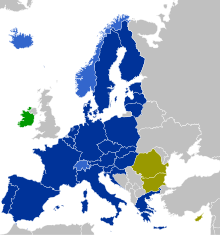European travel information and authorization system
The European Travel Information and Authorization System ( ETIAS ) is an electronic travel authorization system of the European Union (EU) that is currently being developed and is to come into force in 2022. It includes an extended security check for travelers to the European Union and concerns third-country nationals who are exempt from the visa requirement . These will be checked before they enter the Schengen area and if necessary they will be denied travel authorization. The aim is to improve internal security in the EU and prevent illegal immigration, protect public health and reduce delays at borders by allowing people who may pose a risk in any of these areas to arrive at the external borders before they arrive of the European Union .
As of June 2018, this currently affects around 62 countries that are not members of the EU but still follow visa-free travel regulations. In 2014 around 30 million citizens entered the EU without a visa.
The ETIAS is supported by the European Agency for the Operational Management of Large-Scale IT Systems in the Area of Freedom, Security and Justice (eu-LISA). The European Union joins the previous similar electronic travel authorization systems in the United States ( ESTA ), Canada ( eTA ), Australia ( ETA ), India and other countries.
Application and fee
Citizens from third countries must apply for a travel authorization online before starting their journey. For each application, adult applicants must pay a travel authorization fee of 7.00 euros. The application is free of charge for minors. The travel details in each application are automatically checked against the EU databases and the relevant Europol and Interpol databases to determine whether there are any reasons for denying a travel authorization. If no hits or no other elements that require further analysis are displayed, the travel authorization will be granted automatically and promptly. This should be the case for most applications.
Carriers active in air and sea transport must check before passengers board whether third-country nationals who are subject to travel authorization are in possession of a valid travel authorization. From three years after the start of ETIAS operations, this obligation will also apply to international carriers who transport groups of people in buses. No automatic right of entry or residence is granted with the travel authorization; the final decision is made by the border guard.
validity
An ETIAS travel authorization is valid for a period of three years or until the validity of the travel document (passport) registered at the time of application expires - whichever occurs first.
Data synchronization
The future ETIAS will compare the information with the following databases:
- Entry / Exit System (EES) (planned)
- Schengen Information System (SIS)
- Visa Information System (VIS)
- EURODAC (European Dactyloscopy) (fingerprint identification system)
- Europol Information System (EIS)
- Stolen and Lost Travel Documents Database (SLTD) from Interpol
- Travel Documents Associated with Notices (TDAWN) from Interpol
Data to be provided
You will likely need to provide the following information when completing the ETIAS form:
- Information about the applicant
- family name
- Birth Name
- First name
- stage name
- gender
- Date of birth
- Place and country of birth
- Nationality information
- Home address
- E-mail address
- Telephone or cell phone number
- Education and work experience
- Details of the first EU country the applicant intends to travel to. The applicant is obliged to visit the first specified country when entering the EU. Onward travel can still be prevented by the national border officials in the EU even with an ETIAS travel authorization.
- other questions, e.g. on the state of health, on trips made in war zones or conflict regions or to which the applicant was deported or deported as well as previous entries in criminal records.
- In the case of minors, the legal guardian must apply for ETIAS.
- Family members of EU nationals from another country must provide evidence of the relationship, residence permit and other information.
Web links
- Website with information on the European Travel Information and Authorization System (ETIAS)
- European Travel Information and Authorization System (ETIAS): Council confirms agreement with European Parliament Information page of the Council of the EU and the European Council
- Schengenvisainfo.com
